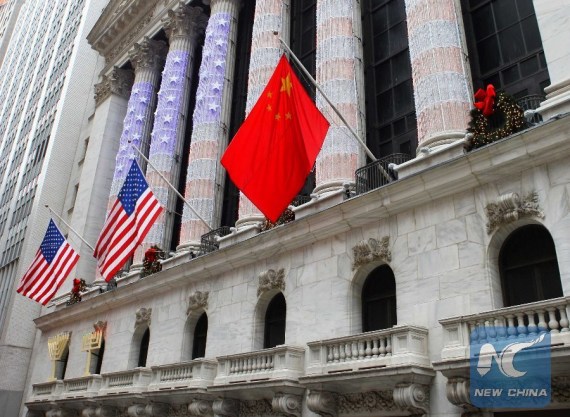 The national flags of the United States and China wave out of the New York Stock Exchange (NYSE) in New York, the United States, Jan. 5, 2009. (Xinhua/Hou Jun) China and the United States are expected to continue cooperation under the new U.S. administration led by Donald Trump, the Chinese ambassador to the United States said Tuesday. Although the Trump administration has yet to formulate its China policy, the general trend of China-U.S. cooperation cannot be reversed as it is "the only right choice" for both countries, said Cui Tiankai on the sidelines of a Lunar New Year reception at the Chinese Embassy. Cui noted that such cooperation is in the interests of both China and the United States, the world's two top economies and permanent members of the United Nations Security Council. He also expressed the hope that the two sides can maintain the multi-layer dialogue and exchange mechanisms, which were created in the past years. Tangible progress has been achieved over the years in China-U.S. joint efforts to build a new model of relationship based on nonconfrontation, nonconflict, mutual respect and win-win cooperation, Cui said. The Chinese envoy listed a range of areas where the two countries can continue and deepen cooperation, including trade, finance, security, energy, infrastructure and mutual investment, as well as some regional and global issues. Cui expressed the hope that the two sides could open up new areas for cooperation as their interests are increasingly intertwined. On the South China Sea issue, Cui emphasized that it is only a dispute on territorial and maritime rights between China and certain ASEAN members, rather than a geopolitical competition between China and the United States. Citing progress being made in the talks on formulating the Code of Conduct in the South China Sea and maritime cooperation, Cui said countries from outside the region should support such efforts to restore tranquility instead of creating new hurdles. Asked about the China-U.S. trade frictions, Cui said China is firmly opposed to fighting a trade war with the U.S. side because both will suffer as a result. "Currently, the world economy needs a strong engine to lead to stronger development and faster growth, it's inescapable responsibility for China and the United States to do this, rather than heading toward a trade war," the ambassador said. On the decision by the Trump administration to quit the Transpacific Trade Partnership (TPP), Cui refuted the notion that China will take over the U.S. role as the global leader who makes the rules of trade in the future. "I think this is a misleading notion, because international trade rules cannot be made by the United States or China alone, and rather, they should be made and implemented by all nations in the world," Cui said. On the Taiwan issue, Cui reiterated that the one-China policy, adopted by previous eight U.S. governments, is the political foundation for China-U.S. relations and is "nonnegotiable." |